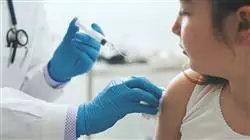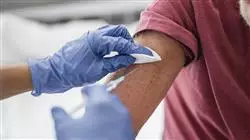University certificate
The world's largest faculty of nursing”
Introduction to the Program
Get trained with TECH Global University with this complete program and increase your specialization in the process of vaccinating pediatric, adult or pathological patients"

The programming of this Professional, Postgraduate diploma will be a contextualization of the vaccines to be administered in Adult patients within the existing vaccine schedules for this age range.
The student will also be able Know some specific circumstances within the group of adults when performing the vaccination process, such as the administration of vaccines to pregnant women and during breastfeeding. Vaccination of this particular group of adult patients requires extensive knowledge of the subject, which will give you confidence in your daily practice.
Another important part of this training is how to administer vaccines to pediatric patients, taking into account the first vaccination in pediatric age and the so-called booster vaccines.
Once immunization in adult, elderly and pediatric patients without a particular pathology has been studied and understood, the nurse will enter into the study of special vaccination situations, generally considered as such due to the specific characteristics of the patients or to chronic or acute diseases that alter the vaccination process.
In this Postgraduate diploma we have proposed to offer you the most complete education on vaccination in a simple and easy to learn way. Also, being a 100% online program, you will have the opportunity to combine your study hours with the rest of your daily obligations, so that you can increase your education in a comfortable way.
Increase your education in the field of vaccination and improve yourself thanks to this highly academic Training”
This Postgraduate diploma in Vaccination in Children, Adults and Special Situations contains the most complete and up-to-date scientific program on the market. The most important features include:
- The development of clinical cases presented by vaccine experts
- The graphic, schematic, and practical contents with which they are created provide scientific and practical information on the disciplines that are essential for professional practice
- New developments on vaccinations
- Practical exercises where self-assessment can be used to improve learning
- An algorithm-based interactive learning system for decision-making in the clinical situations presented throughout the course
- Theoretical lessons, questions to the expert, debate forums on controversial topics, and individual reflection assignments
- Content that is accessible from any fixed or portable device with an Internet connection
Our programs have the best teaching methodology and the latest educational tools, which will allow you to study from home without sacrificing the possibilities offered by on-site classes"
Its teaching staff includes professionals from the field of vaccines in nursing, who bring - the experience of their work to this program, as well as recognized specialists from leading scientific societies.
The multimedia content, developed with the latest educational technology, will provide the professional with situated and contextual learning, i.e., a simulated environment that will provide an immersive program designed to learn in real situations.
This program is designed around Problem-Based Learning, whereby the professional must try to solve the different professional practice situations that arise throughout the program. For this purpose, the professional will be assisted by an innovative interactive video system created by renowned and experienced experts in vaccination and extensive experience Teachers.
This Postgraduate diploma is the best investment you can make in education to acquire the best and most up-to-date Training in vaccination"

Know the particularities of the vaccination process in each patient, according to their characteristics, and perform your work with greater safety"
Why study at TECH?
TECH is the world’s largest online university. With an impressive catalog of more than 14,000 university programs available in 11 languages, it is positioned as a leader in employability, with a 99% job placement rate. In addition, it relies on an enormous faculty of more than 6,000 professors of the highest international renown.

Study at the world's largest online university and guarantee your professional success. The future starts at TECH”
The world’s best online university according to FORBES
The prestigious Forbes magazine, specialized in business and finance, has highlighted TECH as “the world's best online university” This is what they have recently stated in an article in their digital edition in which they echo the success story of this institution, “thanks to the academic offer it provides, the selection of its teaching staff, and an innovative learning method aimed at educating the professionals of the future”
A revolutionary study method, a cutting-edge faculty and a practical focus: the key to TECH's success.
The most complete study plans on the university scene
TECH offers the most complete study plans on the university scene, with syllabuses that cover fundamental concepts and, at the same time, the main scientific advances in their specific scientific areas. In addition, these programs are continuously being updated to guarantee students the academic vanguard and the most in-demand professional skills. In this way, the university's qualifications provide its graduates with a significant advantage to propel their careers to success.
TECH offers the most comprehensive and intensive study plans on the current university scene.
A world-class teaching staff
TECH's teaching staff is made up of more than 6,000 professors with the highest international recognition. Professors, researchers and top executives of multinational companies, including Isaiah Covington, performance coach of the Boston Celtics; Magda Romanska, principal investigator at Harvard MetaLAB; Ignacio Wistumba, chairman of the department of translational molecular pathology at MD Anderson Cancer Center; and D.W. Pine, creative director of TIME magazine, among others.
Internationally renowned experts, specialized in different branches of Health, Technology, Communication and Business, form part of the TECH faculty.
A unique learning method
TECH is the first university to use Relearning in all its programs. It is the best online learning methodology, accredited with international teaching quality certifications, provided by prestigious educational agencies. In addition, this disruptive educational model is complemented with the “Case Method”, thereby setting up a unique online teaching strategy. Innovative teaching resources are also implemented, including detailed videos, infographics and interactive summaries.
TECH combines Relearning and the Case Method in all its university programs to guarantee excellent theoretical and practical learning, studying whenever and wherever you want.
The world's largest online university
TECH is the world’s largest online university. We are the largest educational institution, with the best and widest online educational catalog, one hundred percent online and covering the vast majority of areas of knowledge. We offer a large selection of our own degrees and accredited online undergraduate and postgraduate degrees. In total, more than 14,000 university degrees, in eleven different languages, make us the largest educational largest in the world.
TECH has the world's most extensive catalog of academic and official programs, available in more than 11 languages.
Google Premier Partner
The American technology giant has awarded TECH the Google Google Premier Partner badge. This award, which is only available to 3% of the world's companies, highlights the efficient, flexible and tailored experience that this university provides to students. The recognition as a Google Premier Partner not only accredits the maximum rigor, performance and investment in TECH's digital infrastructures, but also places this university as one of the world's leading technology companies.
Google has positioned TECH in the top 3% of the world's most important technology companies by awarding it its Google Premier Partner badge.
The official online university of the NBA
TECH is the official online university of the NBA. Thanks to our agreement with the biggest league in basketball, we offer our students exclusive university programs, as well as a wide variety of educational resources focused on the business of the league and other areas of the sports industry. Each program is made up of a uniquely designed syllabus and features exceptional guest hosts: professionals with a distinguished sports background who will offer their expertise on the most relevant topics.
TECH has been selected by the NBA, the world's top basketball league, as its official online university.
The top-rated university by its students
Students have positioned TECH as the world's top-rated university on the main review websites, with a highest rating of 4.9 out of 5, obtained from more than 1,000 reviews. These results consolidate TECH as the benchmark university institution at an international level, reflecting the excellence and positive impact of its educational model.” reflecting the excellence and positive impact of its educational model.”
TECH is the world’s top-rated university by its students.
Leaders in employability
TECH has managed to become the leading university in employability. 99% of its students obtain jobs in the academic field they have studied, within one year of completing any of the university's programs. A similar number achieve immediate career enhancement. All this thanks to a study methodology that bases its effectiveness on the acquisition of practical skills, which are absolutely necessary for professional development.
99% of TECH graduates find a job within a year of completing their studies.
Postgraduate Diploma in Vaccination in Children, Adults and Special Situations
Vaccination is one of the most important measures to prevent diseases and protect the health of the population. Nowadays, multiple types of vaccines are continuously developed and applied at different times of life, so it is essential that health professionals are updated in terms of their use and applicability in different contexts to be at the forefront of health. Therefore, the Postgraduate Certificate in Vaccination in Children, Adults and Special Situations was created with the idea of updating your knowledge in this area based on the latest scientific evidence available.
Enroll in a first level updating program.
TECH has designed this Postgraduate Diploma in Child, Adult and Special Situations Vaccination with the intention of guaranteeing your excellent professional update in this field. With this program, you will delve into recent advances regarding vaccination in different stages of adulthood, pediatric stage or in specific conditions such as cases of HIV or cancer patients. You will obtain this update following a 100% online methodology, which will allow you to manage your own study schedules to adapt them to your own personal circumstances.







